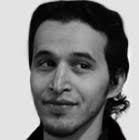Monday
Feb232009
The Latest On Hicham Yezza
 Monday, February 23, 2009 at 22:29
Monday, February 23, 2009 at 22:29
We've just received this from the 'Stop The Deporation of Hicham Yezza' Facebook group (reposted in full, with a couple of tweaks to aid readability on our site):
See also:
Dear Friends,
As many of you might know, Hich lost his case against the Home Office at Northampton Crown Court on Thursday 12th February. The charge is “secure avoidance of immigration control using deception” and comes under the immigration act. The sentencing will take place on March 6th. The charge carries a maximum sentence of 2 years in jail.
We are obviously saddened and disappointed at the outcome, especially considering how hard Hich and the campaign have fought for him to have his day in court. Despite this setback, Hicham’s spirits remain high. His legal team is now considering the various options on offer and we will therefore be releasing a full statement in the coming few days.
Peter Thatchell, one of the UK’s most prominent civil liberties commentators has written a piece about Hicham’s persecution in today’s Guardian, please read it and add your comments. Last week, the Guardian published a piece by Hicham on the subject of Student Occupations.
In the meantime, your continued support is crucial to ensure Hicham is treated fairly and any attempts to deport him are resisted.
Please continue to visit the website for updates and invite your friends to join this Facebook group. Ways to help Hich can be found on the website under “How to Help”.
Thank you and much love,
The Free Hich Campaign
Website: www.FreeHicham.co.uk
Email: StaffandStudents [at] gmail [dot ] com
See also:
tagged  Free Hich,
Free Hich,  Guardian,
Guardian,  Hicham Yezza,
Hicham Yezza,  Home Office,
Home Office,  Nottingham,
Nottingham,  Terrorism in
Terrorism in  UK & Ireland
UK & Ireland
 Free Hich,
Free Hich,  Guardian,
Guardian,  Hicham Yezza,
Hicham Yezza,  Home Office,
Home Office,  Nottingham,
Nottingham,  Terrorism in
Terrorism in  UK & Ireland
UK & Ireland 
 I received the news just after landing in Dublin that Hicham Yezza, who has been a student and administrator at the University of Nottingham for more than 13 years, is to be deported from the United Kingdom. The original charge was that Yezza was aiding and abetting terrorism through the possession on his computer of an Al Qa'eda Training Manual --- he was keeping this as a favour for postgraduate student Rizwaan Sabir, who was working on a thesis on the group. When this couldn't be sustained, the British Home Office decided to press a technicality over Yezza's long-term status as a student and employee of the university.
I received the news just after landing in Dublin that Hicham Yezza, who has been a student and administrator at the University of Nottingham for more than 13 years, is to be deported from the United Kingdom. The original charge was that Yezza was aiding and abetting terrorism through the possession on his computer of an Al Qa'eda Training Manual --- he was keeping this as a favour for postgraduate student Rizwaan Sabir, who was working on a thesis on the group. When this couldn't be sustained, the British Home Office decided to press a technicality over Yezza's long-term status as a student and employee of the university. Hicham Yezza, whose story we covered at
Hicham Yezza, whose story we covered at 